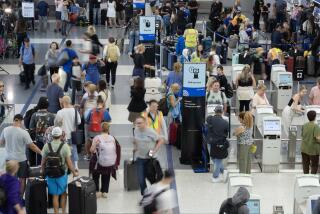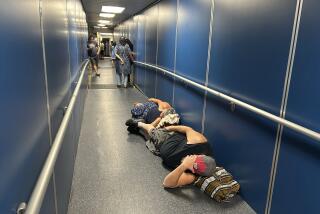Outer Space Outage Signals Growing Dependence on Satellites
- Share via
Doctors were off the golf course and near a phone. Real estate agents were adrift in a red-hot market. Parents lost the lifeline anchoring them to children growing up in a tougher, scarier world. Drug dealers suffered a rare business slump.
To many Southern Californians, the blackout of the pervasive pager--which crept into our lives as a highly specialized emergency tool and somehow evolved, like car alarms and cellular phones, into the unofficial bird call of Los Angeles--was like being yanked off life support.
Others were relieved, even euphoric, that slashing the electronic leash granted them a reprieve from the psychological claustrophobia that walls in a growing number of people who are always on call. Their sudden freedom came Tuesday afternoon, when a communications satellite spun out of control and up to 90% of America’s estimated 49.5 million pagers went silent. Only the 24-hour Psychic Hotline knew who was being paged after that.
To Dan McNally, owner of a Chevron station in Chatsworth, the satellite loss has been more than a nuisance. “Already four of the [credit card] charges I had to put through manually this morning came back declined,” he said. “I’m already out $85.”
McNally said it has been next to impossible to get through on the phone lines to Visa or Mastercard to get authorization for purchases, and customers are angered by the delay.
On Wednesday morning, Mayor Richard Riordan tried to page his press secretary, Noelia Rodriguez, to discuss an annoying news article. She was 20 feet from her office, enjoying a rare work meeting uninterrupted by the high-pitched bleating that mars the soundtrack of her professional life.
“It was nice. The last time I had this much peace and quiet was four years ago, when the Southern California phone system went dead,” Rodriguez said. “When it was announced on the radio, I said, ‘Yes! That’s so cool!’ I’m sure those satellites will be back in working order sooner than many people would like.”
For Eileen Quimpo, it was an unparalleled disaster. Quimpo, the office administrator for six Los Angeles emergency room doctors, needs to deliver patient files and information in minutes.
“Right now, while I’m on the phone, I don’t know if a doctor is looking for me,” Quimpo said. “This is our main means of communication.”
For her techno-dependency, it was cold turkey. Quimpo’s pager is linked to e-mail and a news and sports headline service. “It makes me nervous,” Quimpo said. “I feel like I’ve lost touch with the outside world.”
Doctors were on call the old-fashioned way.
At the Grossman Burn Center in Sherman Oaks, doctors were calling in every half-hour to ask if they were needed. Even Dr. Peter Grossman, the son of the center’s founder, spent the day in the hospital, instead of in his office, just to make sure he could be easily found.
“Doctors are having to be more proactive,” said hospital spokesman Larry Weinberg. “Usually the nurses can track them down. Now they have to make sure they are available.”
At UC Irvine Medical Center in Orange, people on waiting lists for kidney or liver transplants were reassured they would be found should organs become available, said Janet Mize, the medical center’s senior coordinator for transplants.
“We were doing transplants long before there were beepers,” Mize said.
In an announcement over the public address system Tuesday afternoon, when the satellite outage occurred, doctors were told to make sure they were reachable by phone, cell phone, fax or e-mail.
At Los Angeles’ Cedars-Sinai Medical Center, 2,200 doctors use a land-based paging system that was unaffected, but staff members spent Tuesday evening alerting all other employees--by phone--to the pager problem, said Charlie Lahai, the media manager of the facility.
She is leaving her job next month to spend more time with her children and has no regrets about handing in her hyperactive hospital pager, though she will still rely on the “mommy pager” that her children’s baby-sitters and teachers use for emergencies.
On the Van Nuys Golf Course, Mike Barger, who would describe his job only as “in the entertainment industry,” said his pager is his lifeline. For now he’s checking in every hour, just to be safe.
“In my business when they want you, they want you right then. If you’re not available, they move on to the next person on their list,” he said.
At the Northridge Fashion Center, Ron Woldrich, an engineer at nearby Litton Guidance and Control Systems, still had his black beeper hooked on his belt.
“I guess it’s just habit,” he said. “In fact, I came in this morning and I noticed everyone else had theirs on too. I said: ‘What are we all wearing them for?’ ”
Woldrich, who lives in Woodland Hills, said his workplace doesn’t even have an internal paging system. They rely on beepers.
“I think it’s just a question of efficiency,” Woldrich said. “I was trying to think back to what we did before beepers and voicemail. I guess we just left a note in someone’s office on a piece of paper.”
Some can never go back to that time. Not for a nanosecond.
For Andrea Tzadik, an in-demand real estate agent in the feverish Westside market, pagers are not an accessory. They are an umbilical cord to life.
Late Tuesday, a client wanted Tzadik to write an offer: “They were paging me like crazy, and I was out showing.”
A high-level client is coming from out of town, and the relocation scout couldn’t find Tzadik: “She was out of her mind.”
On Wednesday morning, a buyer, unable to make a showing, was forced to send a friend: “It’s crazy!”
There’s more. Her two children have pagers: “With teenagers it’s almost imperative. You want to know where they are.”
Take away her pager, and “I’d be back in the Middle Ages. I can’t live without it,” Tzadik said.
A lot of young Californians know the feeling. Pagers--they come in Day-Glo colors--are a fixture of youth culture, along with a complex language of situationally appropriate numeric messages that would rival any police radio codes.
“I paged and paged my boyfriend, and he was not getting the pages,” said an Orange Coast College student. She thought he was ignoring her.
Mike Tashchyan, 21, got 50 pages a day until Tuesday. “Then nothing,” he said, disconsolately, in an interview in a Van Nuys fast-food joint.
Bummer.
He was still wearing his tiny opaque pager on the slouching waistband of his pajama bottoms, hoping it would come to life again. It was almost as difficult for him to remove as the lacy spider web tattoo covering his left arm.
“I’ve got a lot of friends, and this is the only way they can get ahold of me,” he said, giving the pager a brooding look from under the festive salutation--”Go to Hell”--emblazoned on his baseball cap.
Mike’s friends were really worried about him.
“He always calls me back in less than five minutes,” said Alex Campuzo. “I was scared something bad happened to him.”
At a park in Reseda, Yvonne Aguilar watched her 5-year-old son, Chris, play. Aguilar, 24, who works for the Red Cross, wore her baby pink pager even though it didn’t work.
“I’m out at all different places during the day helping with blood donations,” Aguilar said. “My pager is the only way the people at my son’s Head Start can get ahold of me. I’m looking for a pay phone right now.”
Stephen Rattien, head of a division at Rand Corp., a think tank that does work for the White House’s Office of Science and Technology Policy, said that only a tiny fraction of subscribers use pagers for critical life-and-death events.
“At the other end of the curve are people whose use is somewhat frivolous and marginal, and the downside of their use may actually exceed the benefits,” he said.
“Husbands and wives, and most starkly kids, use pagers as a sort of extension of family life, and it’s not entirely clear this is a desirable surrogate for close interaction,” he said. “I suspect more classwork and homework got done as a result of the failure of the satellite system.”
Rattien suspected that less was accomplished in America’s multibillion-dollar drug trade.
“That’s a prime example of an industry highly dependent on the use of pagers for bringing buyers and sellers together,” he said.
Times staff writers Megan Garvey, Nancy Wride and Marcida Dodson contributed to this story.
More to Read
Sign up for Essential California
The most important California stories and recommendations in your inbox every morning.
You may occasionally receive promotional content from the Los Angeles Times.










